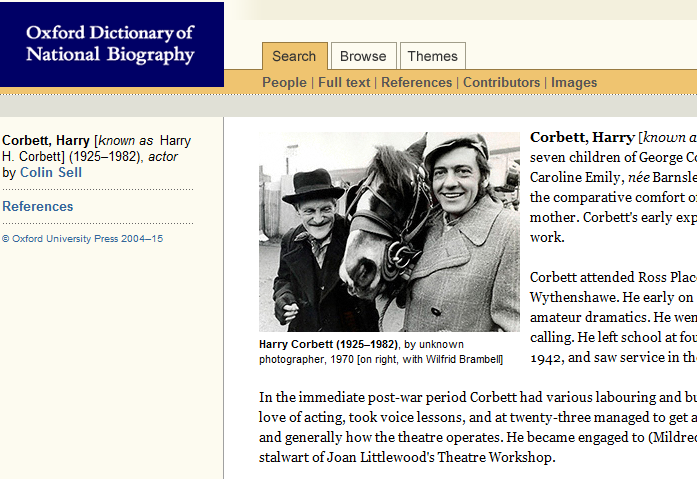A century of British cinema, in the Oxford Dictionary of National Biography
The latest update to the Oxford Dictionary of National Biography—published on Thursday 28 May 2015—adds biographies of 105 men and women active between the fourteenth and the early twenty-first century.
 The new edition includes a special focus on a century of British cinema and television—from the pioneering directors of the early 1900s to the actors, directors, and producers of mid and later twentieth-century films such as Bridge on the River Kwai, Hammer Horror’s Curse of Frankenstein, Rita, Sue and Bob Too, and television classics including Steptoe and Son.
The new edition includes a special focus on a century of British cinema and television—from the pioneering directors of the early 1900s to the actors, directors, and producers of mid and later twentieth-century films such as Bridge on the River Kwai, Hammer Horror’s Curse of Frankenstein, Rita, Sue and Bob Too, and television classics including Steptoe and Son.
Film clips from featured actors, directors and producers, now added to the ODNB
Film biographies now added to the Oxford DNB include:
- film and television actors Oliver Reed (1938-1999) and Harry H. Corbett (1925-1982), known for Steptoe and Son.
- US-born film producer and screen writer Carl Foreman (1914-1984), who came to Britain in the midst of the McCarthy trials, and whose films include High Noon and The Bridge on the River Kwai.
- Lewin Fitzhamon (1869-1961), a pioneer film-maker at Walton-on-Thames in the early 1900s, who made some 400 films—notably Rescued by Rover (1905), starring a pet dog and regarded as a landmark in its cinematic narrative technique.
- World War One film-maker, Geoffrey Malins (1886-1940) whose documentary film of the first day of the Battle of the Somme, 1 July 1916, was seen by millions of British cinema-goers later that summer.
- director Terence Fisher (1904-1980), who made twenty-nine Hammer Horror films including the influential Curse of Frankenstein (1957).
- film-maker Alan Clarke (1935-1990), whose television dramas include Rita, Sue and Bob Too and Scum.
Other biographies now added include:
- Fanny Talbot (1824-1917), benefactor and friend of Ruskin, who made the first ever donation of land to the National Trust, to coincide with the Trust’s formation, in May 1895. Talbot gave land at Barmouth on the Gwynedd coast, known as Dinas Oleu or ‘Fortress of Light’.
- the Poplar councillors (act. 1921) of East London; 30 local politicians imprisoned for refusing to levy a rate in protest at the inequitable distribution of local taxation in the capital.
- chess master Phillip Stamma (d. 1755). Born in Aleppo, Stamma came to Britain in the late 1730s. His The Noble Game of Chess (1745) introduced the concept of the ‘end game’ to Western players of the game.
Faculty contributors to the latest update include John Davis (on the Poplar councillors (act. 1921)), George Garnett (on ‘Magna Carta through eight centuries’), and John-Paul Ghobrial (on Phillip Stamma (d. 1755)).
The Oxford Dictionary of National Biography is the national record of men and women who’ve shaped all walks of British life, in the UK and overseas, from the Roman occupation to the 21st century. It’s a research and publishing project of the History Faculty and OUP and is available via SOLO or Databases A-Z.
Dr Philip Carter, Publication Editor, Oxford Dictionary of National Biography
